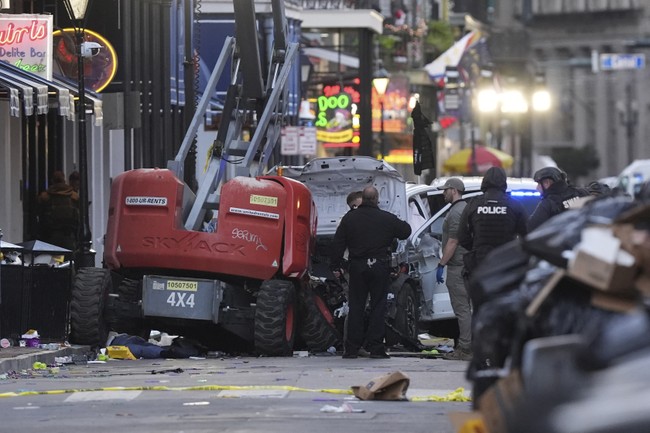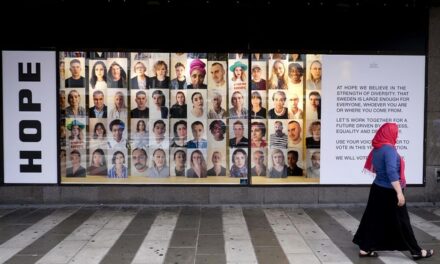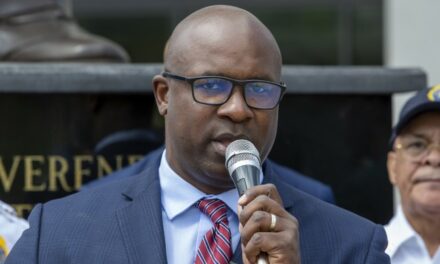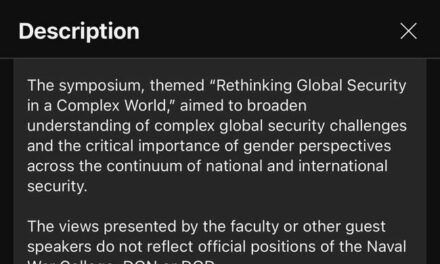We support our Publishers and Content Creators. You can view this story on their website by CLICKING HERE.

At first, the FBI insisted that the mass-murder vehicular attack in New Orleans wasn’t terrorism. Then they announced that Shamsud-din Jabbar had several accomplices to help him place two IEDS, only to reverse that later and claimed that he’d worked alone.
Advertisement
However, a new report from NBC News suggests that Jabbar may have had some assistance with the bombs after all. The explosive used turns out to be so unusual that it has never been used in terror attacks in the West before now, and it’s not at all clear how Jabbar either received it or manufactured it himself:
Federal investigators examining the attack say that Jabbar used a very rare explosive compound in the two devices, two senior law enforcement officials briefed on the matter told NBC News.
Authorities are investigating how Jabbar acquired the knowledge to create this homemade explosive, the officials said.
Those officials say that the explosive has never been used in a U.S. terror attack or incident, nor in any European terror attack. A key question for investigators is how Jabbar learned about the compound and how he managed to produce it.
Let’s get the biggest caveat out of the way: can we trust the accuracy of this report? It’s not as though investigators have covered themselves in glory over the last four days in this case. Presumably, NBC’s sources are in the FBI, since they have taken control of the investigation, and as I noted in my preamble, the FBI keeps hitting reverse on public declarations, let alone unauthorized leaks.
Advertisement
Assuming that this report is accurate and Jabbar used such an exotic explosive, one has to wonder why. Explosives are not difficult to find, and more common explosives would presumably be harder to trace back to a source. One can find Internet recipes to make C4, a common explosive used by the American military and others, without too much trouble. (I’d recommend not Googling that without a specific benign purpose, of course.)
It’s not as if Jabbar’s military experience would have lent itself to expertise in explosives, exotic or otherwise. He primarily worked in Human Resources and Information Technology, although he did do a tour in Afghanistan and qualified as a parachutist too. He may have come across explosives during his tour, but his record shows no particular assignment where Jabbar worked specifically with explosives of any kind as a specialist.
Add to that the curious fire that Jabbar apparently set in his AirBnB rental after his death:
ATF agents on Thursday scoured a St. Roch short-term rental where authorities say a Texas man stayed before he ran down dozens of revelers on Bourbon Street early Wednesday — a home that erupted in flames two hours later.
Joshua Jackson, ATF special agent in charge, said Thursday that a timing device or pressure cooker could explain the delay in the reported fire after police shot and killed Shamsud-Din Jabbar. Authorities say he’d just killed 14 people and wounded at least 35 others in what the FBI has called an act of terrorism.
“The working theory now is that the fire started after Jabbar was already deceased,” Jackson said. “There are a lot of ways that could happen. You could have a timed device. … You could also have pressure cookers, put on top of a stove, filled with gasoline. There are a lot of ways to do it, and that is why the ATF tactical response team is here.”
Advertisement
Sure, there are lots of ways to set a fire after you die, if you expect that to happen in a narrow time frame. But why bother? Criminals will sometimes torch vehicles to remove evidence that might be used against them once police are on the case. If you plan to die in a terror attack, though, why bother torching your rental? Why bother hiding the evidence, unless it implicates others?
That seems like a lot of work and potentially dangerous preparation before an attack, only to deliver an F-U to the FBI later. This action lends itself to a motive of concealment, and since Jabbar’s attack would either have resulted in his capture or death (not to mention his Facebook postings just before the attack), it didn’t intend to conceal his involvement. So who and what did Jabbar want to hide by burning the apartment?
Of course, perhaps the answer to this is just that Jabbar was insane, and of course that’s clearly part of the story. No one commits mass murder in this fashion against completely innocent civilians without having several screws loose. But these actions show a rational purpose of some kind, including the use of an apparently rare explosive that seems far beyond Jabbar’s ken, sane or insane. And all of that suggests that Jabbar had help from someone and wanted to keep investigators from connecting those dots.
Advertisement
Unless investigators have gotten it wrong again, this time on the explosives and the timing of the fire, of course.

 Conservative
Conservative  Search
Search Trending
Trending Current News
Current News 







